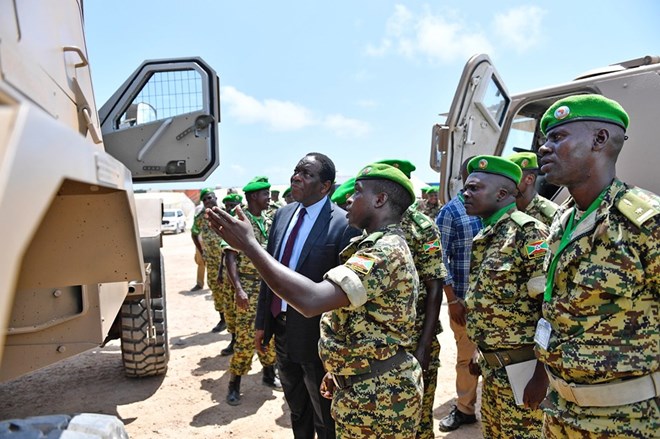The African Union’s new transitional mission in Somalia was unanimously approved by the United Nations Security Council on Thursday, allowing it to take action against al-Qaida and Islamic State extremist groups as well as conduct a phased handover of security responsibilities to Somalia’s government.
The African Union Transitional Mission in Somalia, or ATMIS, replaces the African Union Mission in Somalia, or AMISOM, which has been working in the Horn of Africa nation for the past 15 years to establish long-term peace and security.
While the council’s resolution acknowledges significant changes in the security situation since it authorized AMISOM in February 2007, as well as improvements in Somalia’s ability to respond to security threats, it also reaffirms “the need to combat terrorist threats by all means.”
After three decades of chaos, Somalia has only recently begun to regain its footing, thanks to warlords, the al-Qaida-linked al-Shabab extremist group, and the emergence of Islamic State-linked extremist groups. A political crisis last year pushed back long-delayed elections, and lower house elections that were supposed to take place on March 15 are still pending, further delaying the election of a new president.
The new ATMIS mission will assist Somali forces “in providing security for the political process at all levels,” according to the British-drafted resolution.
The Security Council emphasized that expediting the electoral process and achieving “a peaceful transition of power” will assist Somalia in advancing its national priorities and supporting its 2021 transition plan, which outlines steps toward the gradual handover of security responsibilities from international forces to the government.
“Enabling Somalia to take full responsibility for its own security, including by assuming the leading role in countering and addressing the threat posed by al-Shabab,” the council stated again.
ATMIS is authorized to conduct joint planned operations with Somali security forces “to degrade al-Shabab and affiliates linked to ISIL,” according to the resolution.
The council endorsed the AU Peace and Security Council’s decision to reduce the peacekeeping force by 2,000 by that date, allowing member countries to deploy up to 19,626 uniformed personnel, including a minimum of 1.040 police, until December 31. It authorized a reduction of 17,626 personnel between January 1 and March 31, 2023, and noted that a joint proposal involving the AU and Somalia envisions further reductions to 14,626 personnel in September 2023, 10,626 personnel in June 2024, and “zero personnel” by the end of December 2024.
The Somali government’s intention to create 3,850 new security forces by December 2022, 8,525 new forces by September 2023, and 10,450 new forces by June 2024 is lauded in the resolution.
AMISOM was funded entirely through voluntary contributions, particularly from the European Union, with logistical support from the UN. “Consider providing predictable, sustainable, and multi-year support for ATMIS,” the Security Council urged U.N. member nations, including new donors.
Following the vote, James Kariuki, Britain’s deputy U.N. ambassador, thanked council members for their “support in the adoption of this landmark resolution.”
The resolution “provides a vital opportunity to build on AMISOM’s efforts and take the next steps to roll back al-Shabaab, enabling Somalia to provide the security and stability required for the Somali people to achieve their aspirations,” according to US deputy ambassador Richard Mills.
“Al-Shabab is a formidable and adaptable threat to Somalia and, more broadly, East Africa,” he said. “As al-largest Qaeda’s and best-funded affiliate, al-Shabab poses a threat that necessitates a broad-based and aggressive response.” The ATMIS mandate allows the African-led international effort against al-Shabab to be adapted and re-energized.”
Arian Spasse, Albania’s political coordinator, noted al-increased Shabab’s attacks on security forces and civilians in recent months and urged the government to complete the election process once more.
This email newsletter, which is sent out on weeknights, gives you a quick rundown of the day’s top stories and breaking news, as well as intriguing photos and topics to spark conversation as you wind down from your day.
“It is critical that the newly elected government focus its attention on the deteriorating security situation, reforms, and the humanitarian crisis caused by unprecedented droughts, which is plunging the population into yet another famine,” he said. “Any further delays will give al-Shabaab more time to cast a pall over the government’s efforts to bring peace and prosperity to the country, and will fuel al-Shabab propaganda as a viable alternative to a democratically elected government.”
U.N. Ambassador Abukar Osman of Somalia expressed disappointment that the resolution did not provide more funding for the country’s security forces, address the need for a unified and centralized ATMIS command, or provide more logistical support.
He claims that addressing these issues will ensure that the resolution is in line with Somalia’s security strategy document.

